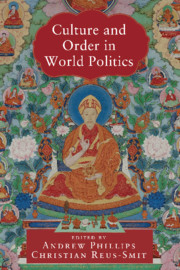‘The second volume of a trilogy, this brilliantly conceived and executed book draws on multiple disciplines (sociology, law, history, and political theory) to develop its central argument. Cultural diversity is patterned by diversity regimes (Ottoman, Chinese, Westphalian) and traceable in a large number of variegated domains (such as religion, gender, law, and global cultural heritage). The compelling results are a wake-up call for much IR scholarship. Culture nap time is over.'
Peter J. Katzenstein - Walter S. Carpenter, Jr. Professor of International Studies, Cornell University, New York
‘This volume pulls off a seemingly impossible task: to illuminate the role of culture in international orders without treating ‘culture' as static, homogenous and bounded. Once and for all we can see beyond the clash of civilizations to better apprehend how cultural diversity matters for world politics.'
Julian Go - Boston University, and author of Patterns of Empire
'Culture and Order in World Politics is a path-breaking collection that sets out a novel and interdisciplinary approach for systematically studying culture, and its impact, in global politics. Challenging the past tendency in IR to subscribe to either simplistic or outdated conceptions of culture, the contributors draw on insights from anthropology, sociology, history and cultural studies to demonstrate how different international orders over time have been shaped by cultural difference. The book's historical breadth, which places the much discussed 'liberal international order' in perspective, along with its theoretically-rich treatment of cultural diversity, will make it essential reading for those seeking to grapple with the enduring reality of cultural diversity and its relationship to international order.'
Jennifer Welsh - European University Institute, Italy
‘… Phillips and Reus-Smit (both, international relations, Univ. of Queensland, Australia) offer a pathbreaking collection on international relations. Written by outstanding international relations scholars … This is an absolutely required addition to the literature on international relations.’
S. R. Silverburg
Source: Choice



